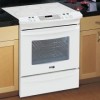Kenmore 4101 Use and Care Guide - Page 29
Using, Setting, Probe, Models
 |
View all Kenmore 4101 manuals
Add to My Manuals
Save this manual to your list of manuals |
Page 29 highlights
Setting Oven Controls Using and Setting Meat Probe (Some Models) Checking the internal temperature of your food is the most effective way of insuring that your food has been properly cooked. When cooking meat such as roasts, hams or poultry you can use the meat probe to check the internal temperature without any guesswork. For some foods, especially poultry and roasts, testing the internal temperature is the best method to insure properly cooked meats. important things to consider: Use only the probe supplied with your appliance; any other may result in damage to the probe or the appliance. Handle the probe carefully when inserting and removing from the food or the receptacle. Do not use tongs to pull the cable when inserting or removing from the food or the receptacle. Defrost your food completely before inserting the probe to avoid damaging probe. Never leave or store the probe inside the oven when not in use. To prevent the possibility of burns, after cooking carefully unplug the probe using a pot holder. Proper Meat Probe placement: • Always insert the probe so that the tip rests in the center of the thickest part of the meat. Do not allow the probe to touch bone, fat, gristle or the pan. For bone-in ham or lamb, insert the probe into the center of the lowest large muscle or joint. For dishes such as meat loaf or casseroles, insert the probe into the center of the food. To find the center of the food visually measure with the probe (See Fig. 1). When cooking fish, insert the probe just above the gill. For whole poultry or turkey, insert the probe into the thickest part of the inner thigh, below the leg (See Fig. 2). Fig. 1 1/2 Fig. 2 USDA Minimum Recommended internal Food Temperature Fish Beef, Veal, Lamb Steaks & Roasts Pork Egg Dishes Beef, Veal, Lamb Ground 145 °F 63oc 145°F 63°C 160°F 71°C For more informations, visit: www.isitdoneyet.gov 160°F 71°C 160°F 71°C Turkey, Chicken & Duck WhoLe, Pieces & Ground 165°F 74oc 29















